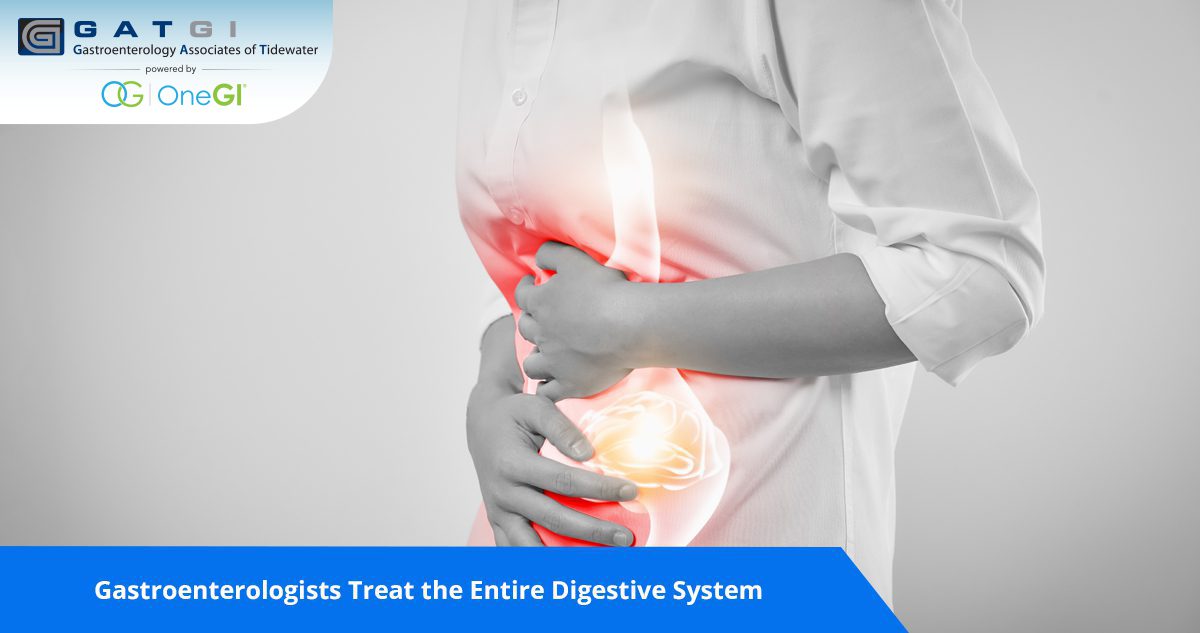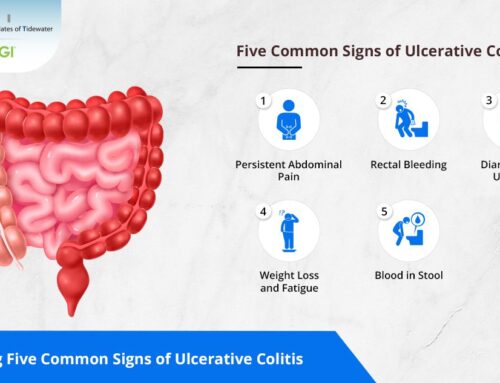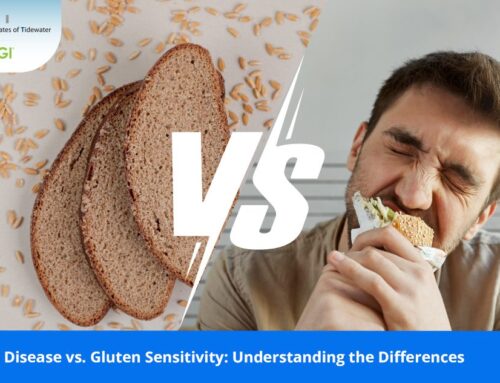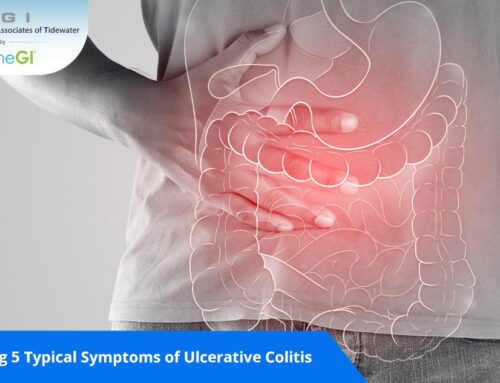Doctors who specialize in digestive diseases and disorders are called gastroenterologists. Gastroenterologists treat the whole digestive system, from your mouth to your anus. They diagnose problems with digestive organs such as the esophagus, stomach, small intestine, large intestine or rectum as well as the gall bladder, liver, bile ducts and pancreas.
All the Gastroenterologists at Gastroenterology Associates of Tidewater are board-certified and have offices in Chesapeake and Virginia Beach.
Some common diseases and symptoms Gastroenterologists treat include:
- Irritable bowel syndrome (IBS)
- Inflammatory bowel disease (IBD)
- Acid reflux
- Pancreatitis (inflammation of the pancreas)
- Hepatitis
- Jaundice
- Polyps in the large intestine
- Gastrointestinal cancer
- Hemorrhoids
- Bloody stool, cramping, bloating
Some of the common procedures that Gastroenterologists perform include the following:
Colonoscopy: Gastroenterologists are also specially trained to perform colonoscopies which help diagnose colon cancer by removing pre-cancerous polyps or growths in the large intestine’s lining. Colonoscopies can also be a screening to prevent colon cancer. The American Cancer Society recommends getting a colon screening by age 45 to prevent colon cancer.
A colonoscopy is a gastrointestinal examination that involves passing a camera, which is as wide as your finger and resembles a thin flexible tube, through the entire colon. In most situations, the doctor will administer a sedative and pain medication before the colonoscopy. As a result, you’ll need someone to drive you after the procedure.
Schedule a colon screening with a colonoscopy with us today through Open Access. Eligible patients may be screened over the phone prior to the colonoscopy. For more information, contact us by calling (757) 547-0798.
Endoscopy: An endoscopy or EGD is a procedure in which your doctor uses a flexible tube with a camera called an endoscope to look at the lining of the upper part of your gastrointestinal tract, including the esophagus, stomach and duodenum.
A flexible tube with a camera at the end will be inserted through the mouth to perform this procedure. In most cases, your doctor will give you a sedative and pain medication prior to the procedure. The process takes roughly 15 minutes and does not obstruct breathing.
Small Bowel Capsule: This allows the Gastroenterologist to check the small intestine’s lining. Traditional endoscopy is ineffective in this region of the gastrointestinal tract because it is difficult to view.
Patients are given a pill-sized camera to swallow that takes pictures as it travels through the intestine naturally. These pictures will be sent to a recorder patients wear on a belt, which will then be recorded. Patients return the recorder at the end of the day, and the doctor will go over these images. The pill camera does not need to be retrieved and will pass with a bowel movement.
ERCP: This procedure is done for multiple reasons including detecting gall stones, bile duct blockages, etc. Endoscopic Retrograde Cholangiopancreatography (ERCP) is a specialized procedure for evaluating the bile duct, which drains the liver and gall bladder and the pancreatic duct.
A thin flexible tube with a camera is passed to the small intestine where these ducts (or tubes) drain. Patients are sedated or possibly anesthetized for this procedure. Preparation usually includes fasting prior to the procedure.
Endoscopic Ultrasound: Endoscopic ultrasound or EUS is a specialized procedure using ultrasound to evaluate many different internal organs.
During this procedure, a specialized flexible tube with a camera and an ultrasound probe at the end will be passed to the upper GI tract. The ultrasound imaging will be used to make close detailed evaluations of various organs including the pancreas, esophagus, stomach etc. During the procedure samples of abnormalities are taken. This is used for the diagnosis and staging of various cancers and other diseases and is performed under sedation.
Liver Biopsy: Liver biopsy is a procedure for evaluating the liver for various liver diseases and problems.
The procedure usually involves having an ultrasound prior to biopsy for locating the best area to biopsy. The area of location is numbed with numbing type medication. A needle is then placed through the skin on your right side into the liver approximately an inch under the skin.
Our board-certified Gastroenterologists see patients in Chesapeake, Virginia Beach and Norfolk. Many of these procedures can be done in our offices in our endoscopy suites.
If you have concerns regarding your digestive health, contact us today to make an appointment with one of our gastroenterologists by calling (757) 547-0798.






